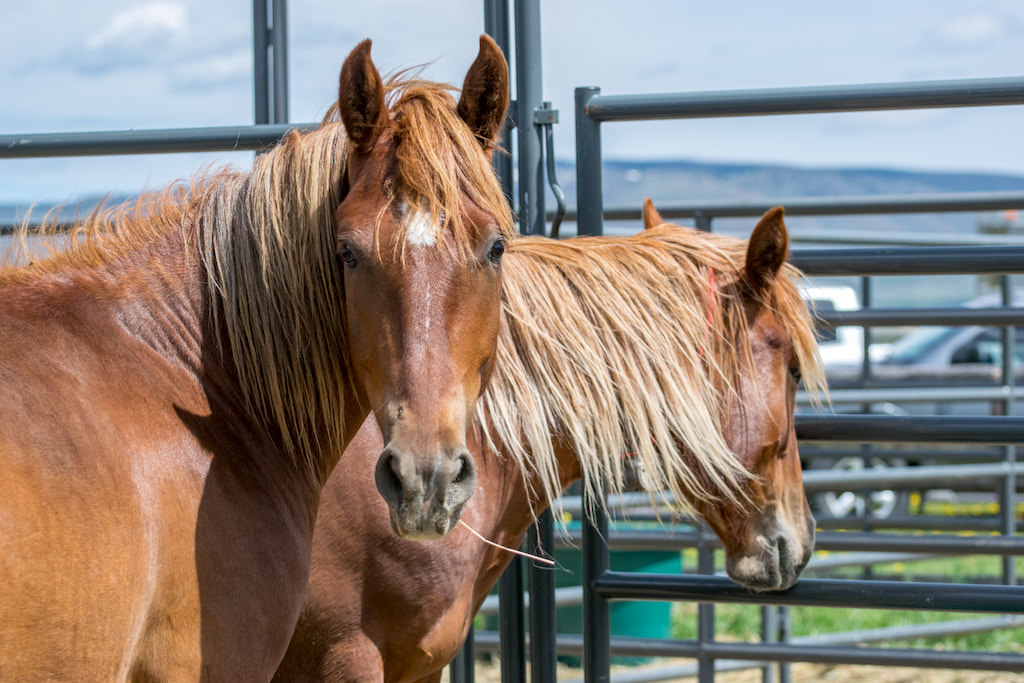Largest Number of Adoptions in 15 Years – More than 7,100 Placed into Private Homes
October 27, 2019 - WASHINGTON— The Bureau of Land Management (BLM) announced last week that it reached a significant milestone by placing 7,104 wild horses and burros into private homes nationwide during Fiscal Year 2019 (which ended September 30). This is the highest number of adoptions and sales the agency has seen over the last 15 years and represents a 54 percent increase (nearly 2,500 animals) over the previous year’s total of 4,609 animals.

Wild horses at the recent wild horse and burro event at Deerwood Ranch in Wyoming. Photo by Nikki Maxwell, BLM.
"We are thrilled to see the tremendous response from the American people to our new adoption initiatives,” said Casey Hammond, Acting Assistant Secretary of the Interior for Land and Minerals Management. “Adopted animals are given good homes and contribute to healthier herds, and is a testament to how strongly our nation is committed to participating in the success of public lands. .”
The BLM attributes the sharp increase in combined adoptions and sales to a number of factors, including an increase in the number of placement events held, an increase in the number of animals offered, and implementation of the Adoption Incentive Program (AIP) last March. The AIP, which offers successful adopters $1,000 to give an untrained wild horse or burro a good home, accounted for nearly 53 percent of all adoptions in 2019.
“The current overpopulation of wild horses and burros represents an existential threat to the health of landscapes across the West. In many places, the range will take decades to recover – and in some cases, it’s unlikely that it ever will,” said BLM Deputy Director for Policy and Programs William Pendley. “For this reason, the Wild Horse and Burro Adoption Program is critical to the health of native wildlife populations and the economic health of countless communities.”
As of March 1, 2019, the wild horse and burro population on public lands was estimated at more than 88,000, which is more than triple the number of animals the land can sustainably support in conjunction with other legally mandated uses, making every successful adoption or sale vitally important in helping the agency regain proper balance.
Given the extensive overpopulation, wild horses and burros routinely face starvation and death from lack of water. The high number of excess wild horses and burros causes habitat damage that forces animals to leave public lands and travel onto private property or even highways in search of food and water.
Placement of wild horses and burros into private care is critical to the agency’s ability to effectively manage these valued resources as integral parts of America’s public lands. Under a 1971 law, the Wild Free-Roaming Horses and Burros Act, the agency is responsible for preserving and protecting these animals as part of a thriving natural ecological system on public lands. The agency achieves this objective primarily by gathering and removing excess animals from the range and offering them for adoption or purchase at facilities and events around the country.
When the number of animals removed from the range exceeds the number the agency can place through adoption or sale, the remaining animals are held in off-range corrals or contracted pastures at taxpayer expense. Currently there are approximately 46,000 wild horses and burros in off-range corrals and pastures. The cost of providing quality, humane care for these animals runs about $50 million annually.
To learn more about the wild horse or burro program, visit https://blm.gov/whb
Source: BLM








